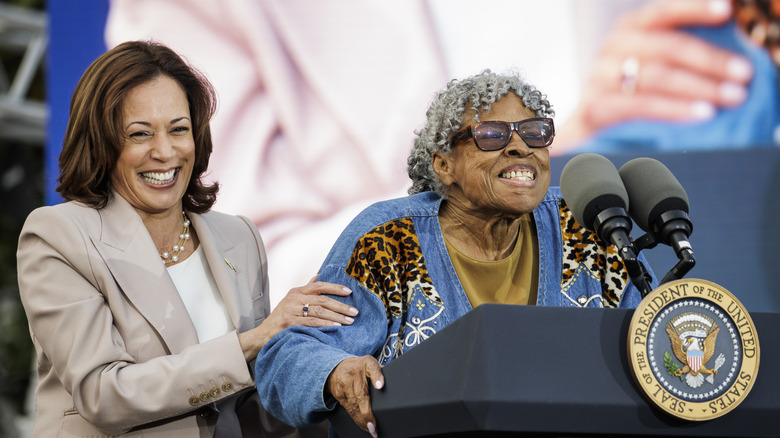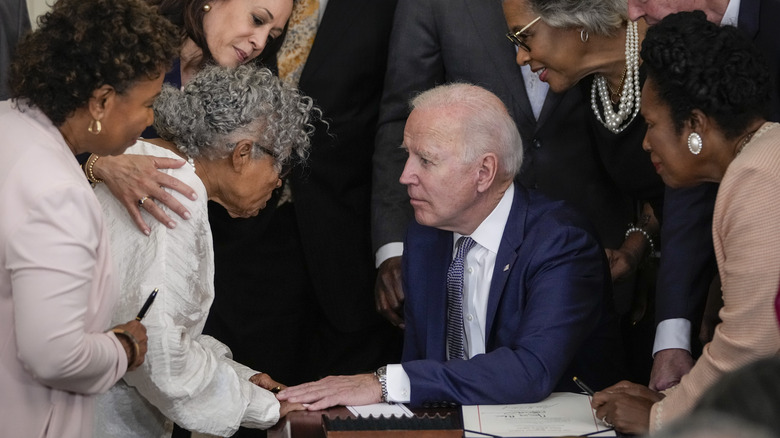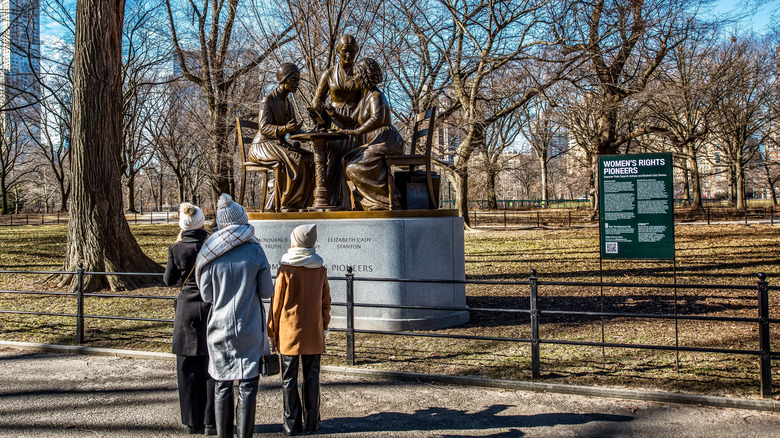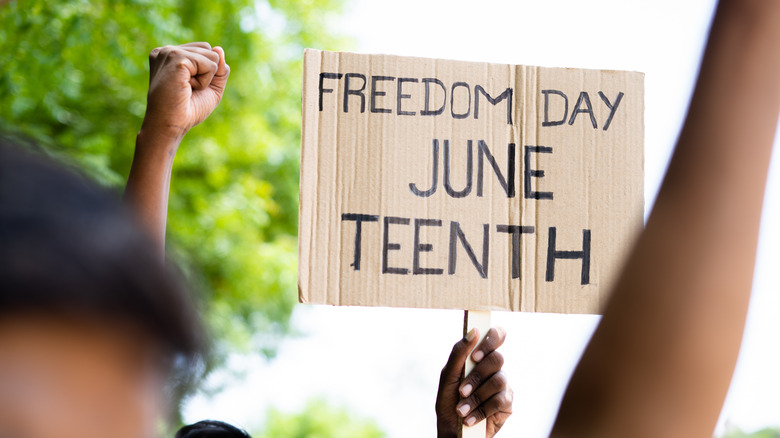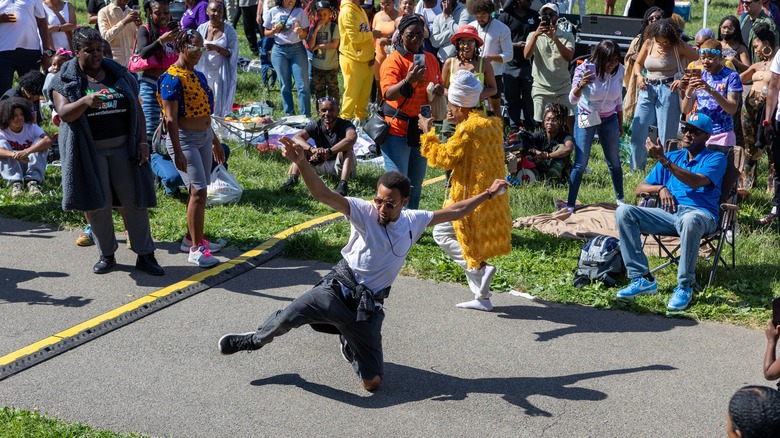The Grandmother Of Juneteenth: How Opal Lee Made The Holiday A Reality
In 2021, when President Biden signed the bill making Juneteenth an official federal holiday, a 94-year-old Black woman named Opal Lee stood by his side. Known as the Grandmother of Juneteenth, Lee spent decades advancing the Juneteenth movement and was instrumental in the creation of the federal holiday.
"Juneteenth Independence Day," "Freedom Day," or even "Emancipation Day" to some is the celebration of the day (June 19, 1865) that Union soldiers informed enslaved African Americans in Galveston, Texas of their freedom. It's important to emphasize that the Emancipation Proclamation, which awarded their freedom, had been issued almost two and a half years before this fateful June day. However, a lack of Union soldiers to enforce the law, combined with the ongoing Civil War made this specific date the first time Union soldiers had actually been able to announce African American independence in Texas.
The holiday grew from celebrations thrown by these newly freed African Americans and their families and continued to be celebrated by their descendants. Despite lulls and resurgences in popularity, Juneteenth has persisted as a celebration among Black communities and, thanks to the hard work of Opal Lee advocating for herself and others, is now a celebration for the whole country.
Opal Lee's contributions
Despite nearly 40 years as a community activist within the Juneteenth movement, it wasn't until 2016, at 89 years old, that Lee credits her work as "going bigger". It was then that Lee decided to tackle getting Juneteenth declared a national holiday, telling NPR, "I knew I just had to spread the word about Juneteenth to everybody." This is when she started her famous campaign, Opal's Walk for Freedom, where she walked from Forth Worth, Texas to Washington D.C. Over the course of many weeks, she walked two-and-a-half miles in various cities along the way. These walks, generally accompanied by speeches and events, symbolized the two-and-a-half years that enslaved African Americans in Texas had to wait to learn that they were, in fact, free.
Despite the popularity of her walks, her initial walk to Congress, where she carried a petition signed by one and a half million Americans in support of a Juneteenth federal holiday, was unsuccessful. The price tag attached to creating a new federal holiday was a deterrent for many lawmakers (the White House estimates it costs $660 million). Add to this the fact that, before Juneteenth, the U.S. had only added four new holidays in the last 100 years (the last one being the much-contended Martin Luther King Jr. Day in 1983) and it wasn't that surprising that the initial vote was no. However, in February 2021, Lee returned to Congress with a new version of the bill, and this time, she got her wish.
Black women's contributions to freedom
Opal Lee is one in a long line of Black women who helped to advance Juneteenth and the greater emancipation movement. Famous examples include Sojourner Truth and Harriet Tubman, who were both abolitionists that were active in women's rights circles. Their work — Truth as an activist and speaker and Tubman as a conductor on the Underground Railroad — was key to helping Black people achieve freedom. Their work also greatly influenced the later Suffragette movement, including Black suffragettes like Ida B. Wells, who would successfully fight for women to gain the right to vote. During the Civil War, enslaved Black women worked tirelessly to undermine the system of oppression they were forced to endure by doing things like destroying property and escaping when they could.
In the late 1800s, Black women were also the ones who organized some of the first Juneteenth festivities. Beyond organization and planning, many of these women also served as public oral historians at the events. These women would educate younger generations of women on the experience of slavery in order to better help them understand why Juneteenth was such a joyous celebration of freedom. This tradition has continued into the 21st Century, with Black women continuing to be an integral part of the holiday, organizing and planning Juneteenth celebrations big and small.
Why Juneteenth is so important today
Juneteenth has transformed over the years into a celebration of not only African American freedom but also a way to celebrate their achievements. Opal Lee told NPR that she hoped that people "all over the country can cherish it as a day of unity." The holiday took on new significance in the aftermath of the killings of George Floyd, Breonna Taylor, and Ahmaud Arbery.
Marcus Watson, a Buffalo State College assistant professor of Africana studies explained to Buffalo State, "Giving recognition to Juneteenth is a Black Lives Matter phenomenon. It has to be explicitly stated that Black lives matter because for so long Blacks were not even considered part of the human family in the eyes of white supremacists [...] It's very important that Juneteenth is gaining the recognition it has and that Black people's independence is recognized as a real thing." While there is still much to be done regarding racial discrimination in this country, particularly as it applies to law enforcement, making Juneteenth a nationally recognized federal holiday was definitely a recognition of the progress the country is striving for.
As for Opal Lee, she said in 2021 that she would be spending her Juneteenth celebrations giving thanks and also, "I'll be thinking of my ancestors. I'll be thinking about my great-great-grandchildren and my grandchildren and my children."
How to celebrate Juneteenth
Throughout the remainder of the 1800s, Black communities celebrated June 19th with parades, celebratory food, and festivals. In addition to being a celebration of the last vestiges of slavery, Juneteenth was (and continues to be) a time for reassuring one another and a time for reflection. Steve Peraza, a Buffalo State assistant professor of history described to Buffalo State another meaningful way people celebrate the day: "A special custom at Juneteenth celebrations and all that came after is the singing of slave spirituals, the songs that helped bondsmen survive the brutality they endured at their masters' hands."
Opal Lee also added a new way to celebrate the day with her annual two-and-a-half-mile walks. As a federal holiday, more and more cities have added celebrations and events on Juneteenth. From exhibitions to festivals to tours, finding events and ways to celebrate and honor the day is easier than ever. If you still need ideas, Juneteenth.com even has recommendations for ways to celebrate the day. Perhaps the most important thing to remember about Juneteenth is that while it is absolutely a time to reflect on the nation's difficult history, it is also a chance to celebrate how far we've come. A blend of somber and elation, Juneteenth is a way to celebrate the Black community, and having that celebration at a national level is powerful.
